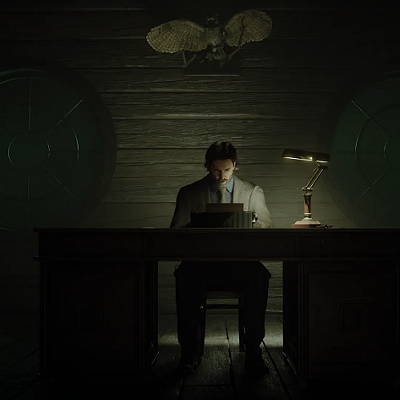Throughout the ten-episode viewing cycle of The People v. O.J. Simpson, the re-enactment of the trial that gripped America for 15 months back in the mid-’90s and the first season of the new FX series called American Crime Story, there were a number of things I learned about the trial itself that I didn't previously know, but perhaps my biggest takeaway was something I learned about myself. Allow me to explain.
In the TV viewing world in which we live in 2016, where everything is DVR-able and, for the most part, people respect the etiquette of spoilers, even the very good TV shows can get tabled a day or two for first-time viewing. Life gets busy; sometimes TV has to take a back seat. It happens. As current weekly, episodic shows go, Better Call Saul, Billions and Monday Night RAW all fit the bill of "must watch, but can watch them tomorrow or the next day."
Then there was The People v. O.J. Simpson.
Not only did I have to watch this at 9 p.m. Central every Tuesday night, I found myself counting down the minutes until it started. The series was that well cast, that well acted and miraculously that capable of providing twists and turns in a saga to which we all knew the ending and to which (we thought) we all knew most of the blood-soaked bricks in the road that led to the verdict.
So I learned that my personal designation between "very good TV show" and "GREAT TV show" is separated by the necessity of watching it as soon as it runs for the first time on television. Perhaps this has always been the case for me, with shows like The Sopranos and Game of Thrones, but The People v. O.J. is what made me self-aware.
When I first heard that this series was going to be a thing (and especially when I heard that the cast included John Travolta, David Schwimmer and Cuba Gooding Jr. ALL IN ONE ROOM!), I expected something extremely campy, like True Detective meets Sharknado. And while there was just the perfect amount of "camp" sprinkled on top, the series skewed far more toward "critically acclaimed" than "guilty pleasure."
Based on the Jeffrey Toobin book about the Simpson trial, The Run of His Life: The People v. O.J. Simpson, the series captured perfectly the nationwide divisiveness that the trial and defense team tactics spawned, as well as the exasperation of the prosecution (and most people with an ounce of common sense) that there were 12 jurors and millions of Americans who thought Simpson could possibly have been framed for the murder of his ex-wife Nicole and her friend Ronald Goldman.
Whether they meant to or not, the directors of the series even made us largely forget that there were actually two people murdered at the genesis of this whole circus, as the focus was mostly on the lives and living "characters" that were part of the trial. The quick fading of focus on Nicole Brown and Ronald Goldman, two people butchered in cold blood, might sadly be the most authentic thing about a truly authentic miniseries.
Getting a little more granular, there were winners and losers in the re-enactment of this 15-month pop culture and court system phenomenon. Let's take a look at a few...
WINNERS
4. Sarah Paulsen (Marcia Clark)
If I had to bet on one actor or actress to take home some hardware for his or her efforts in this series, it would be Paulsen in her portrayal of prosecuting attorney Marcia Clark. In 1994 and 1995, we were able to consume just the one-dimensional version of Clark on television every day as she tried to put Simpson behind bars. This series took us all inside the personal struggles of Clark, both with her marriage as well as her dealing with being a woman in what was still very much a man's world. We also learned about Clark's personal relationship with fellow prosecutor Christopher Darden, which seemed to fluctuate between "fond" and "amorous" throughout the trial. If there's one scene that the real Clark probably watched and about which she said, "I wish I'd done more of that during the trial," it would have to be the one in the bar with Darden and Darden's group of buddies, all African-American, where, in about 90 seconds, Clark painted such an iron-clad case against O.J. Simpson that you wondered if there may actually be an alternate ending to this miniseries in which the jury finds Simpson guilty. (Of course, one of Darden's buddies responded to Clark's tour de force with a sheepish "Maybe." What a trial.)
3. Sterling Brown (Christopher Darden)
Staying with the prosecution, Brown's portrayal of and physical similarity to Darden was so close to identical that I joked with a buddy of mine that the rolling credits at the end should read "Christopher Darden as Himself." Brown was excellent. Similarly to Clark, Darden had behind-the-scenes struggles during this trial that America may not have gleaned from merely watching TV coverage of the courtroom. For Darden, an African-American being plunked down on what was perceived to be the "white" side of the most high-profile murder trial in history, this trial was a series of straws that all came close to breaking the camel's back that was Darden's own sanity. In the end, the defense team's ability to push Darden's buttons led to several lunatic fringe outbursts and the crucial tactical mistake in which Darden had Simpson try on the gloves, a visual that will be in history eBooks for centuries to come.
2. Courtney B. Vance (Johnnie Cochran)
If the acting in this series were an MVP ballot, I'd probably fill mine out "1. Paulsen, 2. Vance, 3. Brown." Vance's portrayal of the bombastic Cochran was the most three-dimensional of any character in the series, which is saying something, considering Paulsen's epic performance. From Vance, we got the spot-on reprise of the courtroom scenes we saw on television, along with the quiet scenes of Cochran at home with his wife and scenes of private moments in which he strategizes with the defense team, meetings in which Cochran was clearly the alpha dog. Standing ovation for Vance.
1. Whoever was in charge of casting
So I lay out these first three winners to give credit to the entire decision-making process in casting The People v. O.J. Simpson. The IMDB.com page lists "Series Casting" as being done by four people, named Nicole Abellera, Jeanne McCarthy, Nicole Daniels and Courtney Sheinin. If it's that quartet that deserves the accolades, then kudos to them! Not only with choosing Paulsen, Brown and Vance, but selecting Travolta, who deftly pulled off the role of the harried and conflicted Shapiro (even if Travolta did look like he was wearing a Travolta mask), and Nathan Lane, who delivered a rousing version of "Dream Team" lawyer F. Lee Bailey. Even secondary characters, like Kenneth Choi playing Judge Lance Ito and Joseph Siravo playing Fred Goldman, gave you the feeling you were watching the actual trial footage all over again. I think in acting it's harder to portray an already (or at one time) existing person than it is a brand-new fictional character, mainly because it's hard to make a real person "your own" by coloring outside the lines. The cast, in large part, in this miniseries hit it on the proverbial screws in their performances of actual people whose real characters we were bludgeoned with daily back in 1995.
LOSERS
4. The Kardashian kids
As with any non-documentary reprise of real-life events, there were some factual liberties taken in The People v. O.J. Simpson. In fact, Rolling Stone kept a running tab on how truthful certain significant occurrences were in each episode. Maybe the most awkward shoehorning of pop cultural relevance into the series was the insertion of the Kardashian kids in the early episodes right after the murders, when their father, Robert, was such an instrumental figure in the backing of his buddy "Uncle Juice." Two scenes in particular stand out — the first was the scene in which a perturbed, preteen Kim gets angry with a TV reporter's pronunciation of "Kardashian" and proceeds to lead her siblings in a chant of their name ("KAR...DASH...I...AN!! KAR...DASH...I...AN!!!") while sitting in front of the television, and the second was a scene in which Robert took the kids out to breakfast and gave them a verbal life lesson about it being more important to be a good person than a famous person. I don't think the pep talk stuck, Bob. Speaking of Bob...
3. The legacy of Robert Kardashian as a man
In a perfect karmic world, there would be some sort of cosmic punishment awaiting all of O.J.'s cadre of sycophants who took up for him in the wake of the painfully obvious evidence that he brutally murdered two people. While Kardashian seemed to realize about halfway through the series that there's no way his beloved "Juice" was telling the truth, I would say that the gods still inflicted posthumous punishment on Kardashian by having the directors select the ultra-mopey, hyper-annoying Schwimmer to play his part. Go ahead and assume that if David Schwimmer is playing the part of you in anything, you are a truly awful person to be around.
2. The jury, the jury selection process and most things jury-related
This is the first time we've put 12 faces (actually more faces than that with the seemingly daily removal of jurors for alternates throughout the trial) with the decision to acquit Simpson. It was both fascinating and a little depressing watching the jury selection process, with each side trying to push for jurors whose profiles helped push its own agendas, so little of which had to do with the actual murder of two people. We learned that the jury was initially split 10-2 on acquittal, but got very little insight on how they were able to flip the final two "GUILTY" votes to "NOT GUILTY." That was disappointing. When it comes to the jury, I think Shapiro put it best when it was announced they'd reached a verdict after just four hours of deliberation — "They discussed this case less than anybody in America."
1. Cuba Gooding Jr.
If there was one glaring casting faux pas in the series, it was Gooding as Simpson, not because Gooding performed poorly but because, unlike many of his contemporaries in the cast with their roles, Gooding has no real physical or behavioral similarities to Simpson, other than being energetic and African-American. At times, I found myself pretending that it was Rod Tidwell (Gooding's character in Jerry Maguire) on trial instead of Simpson, which made for some funny, snickering-to-myself moments that annoyed my girlfriend to no end. The good news is that, of all the characters in The People v. O.J. Simpson, Simpson was about fifth or sixth on the list of focal points, so the glaring differences between Gooding and Simpson were not really series-impacting.
Because, in the end, this series was more about those hit with the ripple effect of Simpson's alleged crimes than about Simpson himself, a portrait of pop culture in the infancy stages of the Internet and about a decade before social media, which would have imploded from congestion and overuse if it had existed during this trial.
Listen to Sean Pendergast on SportsRadio 610 from 2 to 7 p.m. weekdays. Also, follow him on Twitter at http://twitter.com/SeanTPendergast and like him on Facebook at https://www.facebook.com/SeanTPendergast.
Support Us
Houston's independent source of
local news and culture
account
- Welcome,
Insider - Login
- My Account
- My Newsletters
- Contribute
- Contact Us
- Sign out
[
{
"name": "Related Stories / Support Us Combo",
"component": "11591218",
"insertPoint": "4",
"requiredCountToDisplay": "4"
},{
"name": "Air - Billboard - Inline Content",
"component": "11591214",
"insertPoint": "2/3",
"requiredCountToDisplay": "7"
},{
"name": "R1 - Beta - Mobile Only",
"component": "12287027",
"insertPoint": "8",
"requiredCountToDisplay": "8"
},{
"name": "Air - MediumRectangle - Inline Content - Mobile Display Size 2",
"component": "11591215",
"insertPoint": "12",
"requiredCountToDisplay": "12"
},{
"name": "Air - MediumRectangle - Inline Content - Mobile Display Size 2",
"component": "11591215",
"insertPoint": "4th",
"startingPoint": "16",
"requiredCountToDisplay": "12"
}
,{
"name": "RevContent - In Article",
"component": "12527128",
"insertPoint": "3/5",
"requiredCountToDisplay": "5"
}
]
KEEP THE HOUSTON PRESS FREE...
Since we started the Houston Press, it has been defined as the free, independent voice of Houston, and we'd like to keep it that way. With local media under siege, it's more important than ever for us to rally support behind funding our local journalism. You can help by participating in our "I Support" program, allowing us to keep offering readers access to our incisive coverage of local news, food and culture with no paywalls.
Sean Pendergast is a contributing freelance writer who covers Houston area sports daily in the News section, with periodic columns and features, as well. He also hosts the morning drive on SportsRadio 610, as well as the pre-game and post game shows for the Houston Texans.
Contact:
Sean Pendergast
Trending Arts & Culture
- Thornton Wilder's The Emporium Takes the Stage at Alley Theatre
- New Tome Details North America's Uncivil Times
- The Hills Are Alive at the Wortham With HGO's The Sound of Music
-
Sponsored Content From: [%sponsoredBy%]
[%title%]

Don't Miss Out
SIGN UP for the latest
arts & culture
news, free stuff and more!
Become a member to support the independent voice of Houston
and help keep the future of the Houston Press FREE
Use of this website constitutes acceptance of our
terms of use,
our cookies policy, and our
privacy policy
The Houston Press may earn a portion of sales from products & services purchased through links on our site from our
affiliate partners.
©2024
Houston Press, LP. All rights reserved.




